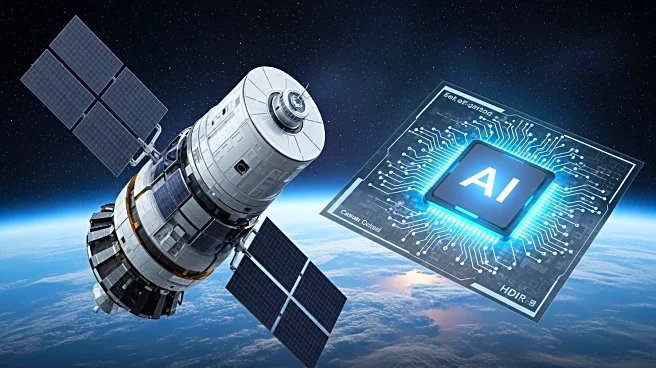What's Happening?
China is rapidly advancing its space and artificial intelligence capabilities, raising significant concerns for the U.S. military. The Chinese government is deploying a range of military satellites and conducting orbital operations that the U.S. perceives as potential threats in the 'next theater of war.' China is also making strides in space exploration, with plans to send astronauts to the Moon by 2030 and collect Martian soil samples by 2031. Additionally, China is developing methods to de-orbit space junk, which could have military implications. The Chinese firm DeepSeek has unveiled a super-efficient AI service, challenging American dominance in AI technology. These developments are part of China's broader strategy to enhance its technological and military prowess, potentially shifting the global balance of power.
Why It's Important?
China's advancements in space and AI technology have significant implications for global security and technological competition. The U.S. military is concerned about China's potential to dominate space, which is increasingly seen as a critical domain for future military operations. China's progress in AI and space technology could undermine U.S. strategic advantages, leading to a shift in global power dynamics. The development of anti-satellite weapons and sophisticated AI systems poses a direct challenge to U.S. national security. Furthermore, China's ability to offer advanced technological services globally could make resistance to its influence increasingly difficult, impacting U.S. economic and technological leadership.
What's Next?
The U.S. is likely to intensify its efforts to counter China's advancements in space and AI technology. This could involve increased investment in space exploration and AI research, as well as the development of new military strategies to address potential threats from Chinese space operations. The U.S. may also seek to strengthen international alliances to counterbalance China's growing influence. Additionally, there could be increased scrutiny and regulation of Chinese technology companies operating in the U.S. to mitigate potential security risks. The evolving technological landscape will require the U.S. to adapt its policies and strategies to maintain its competitive edge.
Beyond the Headlines
China's technological advancements raise ethical and privacy concerns, particularly regarding the use of AI and surveillance technologies. The integration of Chinese technology into global networks could lead to increased monitoring and data collection, potentially infringing on individual privacy and freedoms. The global reliance on Chinese technology could also lead to geopolitical shifts, with countries aligning more closely with China due to its technological offerings. This could challenge existing international norms and lead to new forms of digital and economic dependency. The long-term implications of China's rise in technology and space exploration will require careful consideration by policymakers worldwide.










